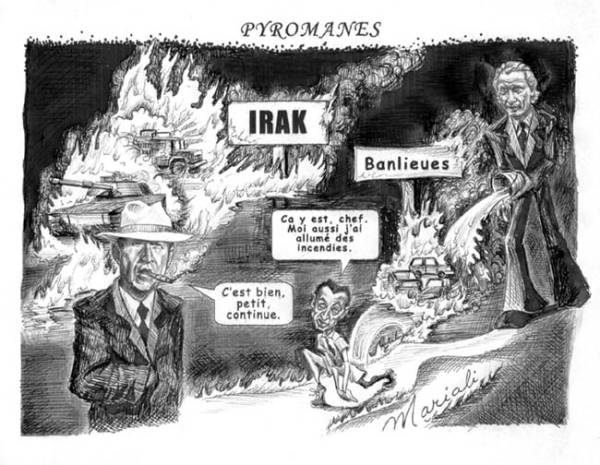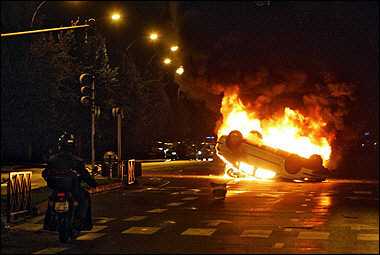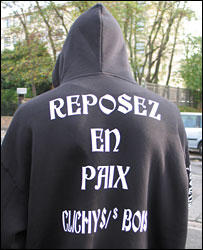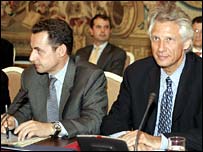
DECEMBER 2005

Mariali creations marilyse@9bit.qc.ca
The
Anger of the Suburbs
by Laurent
Mouloud
Translated by Henry Crapo
l'Humanite - 2005/11/06
http://www.humaniteinenglish.com/
Incidents continued these recent days in several cities,
and have even spread outside the department of
Seine-Saint-Denis. Our reports from Clichy-sous-Bois and
Aulnay-sous-Bois show a real social exasperation of the
youth.
The Anger of the Suburbs
"An immense hopelessness", sums up the
situation, Vincent, 21 years of age. This was the week
that flames rose in (the department of)
Seine-Saint-Denis. Overnight Thursday-Friday at least 150
cars were destroyed by fire in this one department. There
had been as many the night before. The death of two
adolescents, electrocuted in a transformer enclosure of
the EDF (public electricity company) in Clichy-sous-
Bois, Thursday 27 October, after a police control,
doubled by provocations by Nicolas Sarkozy, crystallized
an anger that awaited only such a signal to awaken it.
And started a veritable guerilla movement, the end of
which one sees with difficulty.
Vincent is not surprised. He lived in Aulnay-sous-Bois,
and knows Clichy-sous-Bois like the palm of his hand. For
him, the observation is evident. "Everyone knows
that misery reigns in these neighborhoods, and that they
let the situation rot. Moreover, they make it worse every
year. Do you expect that it won't explode? I don't
approve of this violence, but I understand it." And
this time, for sure, it's serious. Very serious.
"It's been for years that certain have seen this
coming. They're not going to sit by and watch the train
pass. And don't believe that it's only delinquents in
random violence. I have friends who were in the high-
school movement last year, who were very disciplined, and
now they're out burning cars! In their minds, this is a
new way to continue the struggle. I believe there is here
a new branching point, a breaking-off."
Clichy-sous-Bois,
example of a pauperized neighborhood
These fires in the suburbs were just waiting to be set.
Nicolas Sarkozy blew on the coals. His provocations
awakened the memory of years of frustration, of more or
less contained rage. There was this week of violence,
which is unacceptable. But over and beyond this, there is
a generalized feeling of having supported too much
injustice. A packet of neighborhoods where the law has
been social exclusion, discrimination, misery, as much
economic as cultural.
It is not by chance that all this takes place in
Clichy-sous-Bois. This little city of 28,000 inhabitants,
with its ordinary poverty and an astronomical
unemployment rate, its buildings shamefully degraded, its
public services bled to death. Clichy-sous-Bois, the
cradle of the rebellion, remains a model of the
pauperized community where the youth is disqualified in
advance, stigmatized in the press when it is not directly
labelled "scum" by a government minister in his
perpetual electoral campaign. The sickness of these
suburbs didn't arrive on the winds. Injustice is not
merely a feeling. "Just take the school for
example", explains Samir, a sports educator in
Clichy-sous-Bois. "All the youth know that they
won't find equality if they go to high school here. They
will have the chance of a snowball in Hell to enter one
of the 'grandes écoles' (national system of specialized
higher education leading to the best jobs). How do you
justify that?"
Clichy-sous-Bois, it's the history of a town that
accumulates handicaps. 20% unemployment on the average,
with neighborhoods where this rises to 40%, even 50%. A
population among the youngest in France, where more than
half of the residents are under 25 years of age.
Thirty-six different ethnic groups and many "new
arrivals" who land often in great financial
difficulty, an isolated geographic situation, with
neither metro, railway station, nor national highway. A
half-starved municipal budget in a town where few
enterprises (and the professional tax which comes with
them [normal source of town budgets]) accept to come and
establish work sites. And as if this were not sufficient,
the town has the particularity of having a great number
of heavily degraded condominiums. Almost 1570 of the 9000
housing units, where there are crowded often several
families forced to pay rents of 1000 euros per month to
unscrupulous "sleep-merchants". "The
complex 'La Forestière' has even become the national
show-window model of this sort of condominium in sad
state, where it is difficult to intervene because it is
private property", laments Stéphane Teste,
communications agent. "All this gives rise to a real
feeling of abandonment on the part of the
residents."
Despite all this, at the city hall of Clichy they say
they are surprised by the amplitude of these
events."It is true that Clichy is a difficult town.
In the ten years since our election, we have had a number
of crises", says Olivier Klein, first adjoint to the
Mayor, in charge of town policy. "But we have never
had an explosion like this one, with such a rise in
violence."
Here, everyone, the Mayor Claude Delain (of the Socialist
party) at the lead, points his finger at the
heavy responsibility of Nicolas Sarkozy. "His
remarks created tension in the neighborhoods. And when
the youth and the not-so-young, whose daily lives are
infected by social injustice, hear a minister talk of
them that way, it is very difficult for them to find
tranquility and reason."
By all evidence, the propensity of France's Cop Number 1
to defend his "men" rather than to call for an
impartial inquiry, taken together with the absence of
official condemnation by the state following the
launching of a tear-gas grenade into the Bilal mosque,
have confirmed once again that the forces of justice will
not be on the side of the inhabitants of the housing
complex. "Among many of the youth there is a real
revolt against the institutions", says Olivier
Klein. "They don't believe in those institutions,
they no longer feel involved, because they see that the
institutions do not play a role of reducing social
inequalities. And the attitude of the government in this
affair has only reinforced this conviction and multiplied
the anger."
The suffering is intense. And the short-comings of the
public powers is evident. "Just in
Seine-Saint-Denis, there were 160 teaching positions not
filled at the reopening of schools this fall. There are
still 80 posts vacant", observes a school director.
This is too much, the needs are enormous. In
Clichy-sous-Bois the three middle schools and the high
school are classified for educational priority since
1995. "That's OK", continues our director,
"but the ministry of National Education has at the
same time closed special advancement classes that
permitted a more individualized approach. Today, this is
no longer possible." The level of education in
primary school is low, very low. The average of national
evaluations in CE2 and in 6ème (equivalent of grades
5-6) is lower than in all the other ZEP (educational
priority zones).
Social
exclusion continually on the rise.
For many, in Clichy, social exclusion has gotten worse
these past years. "We have the feeling of being
trapped in here. We are not the ones who have the keys,
it's them ...", says Skarj, a strapping lad who got
involved in the rap, after having "escaped" via
a high-level effort in soccer. "That permitted me to
travel, to open the world. But the majority of the youth
don't have this possibility. For them it's difficult for
them to imagine another future than in the housing
complex."
The word discrimination comes up in all the
conversations. The idea that in France, not everyone is
lodged under the same sign. "The kid who watched his
older brother, for years, kicked out with his
Curriculum Vitae because of his Arab name, what do you
expect him to think?", asks Samir, again, the sports
educator. He grew up with the idea that the society
expected nothing of him, or worse, that it didn't need
him. "This sort of thing, it kills all hope in the
heads of the youth. .." But not just that. It also
brings them together. They are united in this terrible
vision of living a common destiny: that of the abandoned,
the cast off, the disdained.
In Clichy as elsewhere, the youth of the housing
complexes feel themselves branded with a hot iron. And
if, by chance, they forget it, the incessant controls by
the heavy-weights of the anti-criminality brigade, the
famous BAC, are there to remind them. The police, this is
the favorite subject of conversation at the foot of the
apartment buildings. Stories of unsheathed
"Flash-Balls", identity controls, and
humiliations of all sorts, abound. "Just during the
last month, I was subjected to three controls", says
Vincent. Each time I felt myself literally aggressed. The
cops don't look for pacification, just to crush you, to
make you shut your face. Me, every time I tried to talk
with them they would say "Stop trying to play
intelligent" "Don't get clever -- we can break
your life". One evening, assures us, the young man,
things turned bad. "They came to control us. They
went up to one of my friends who is black. "You,
you're involved in something!" They handcuffed him,
put him in a car, and carted him around like that for
hours. He came back with his cheeks swollen by the blows
to his head."
Between the youth and the cops the divorce is
complete. Many explain the flight of the two adolescents
who were electrocuted by this visceral fear that men in
uniform inspire. "In the heads of the young, the cop
is the nasty guy, with whom no dialog is possible",
says Eric, thirty year of age, who is producer for rap
groups in Clichy. It's true, the police aren't here for
talk. The dialog, it's for the politicians to organize,
to channel. But since they don't do that, or do so very
little, it's on the police that we dump all the
hatred."
Despite
this, there exist true social meeting-places
Sure, the warlike discourse of the minister of the
Interior only makes things worse. Including for the
police, who are caught in this impasse. "Now, it's
them against us", resumes a youngster, boiling with
anger. Finished with talking, time for the billy-stick.
Sign of the times, since 2002 the commissariat of Raincy,
from which Clichy-sous-Bois depends, saw its forces
devoted to local urban police (PUP) diminished from 30 to
15. As for the local office of the police for proximity,
constructed already in 2002, it has never been put in
service. "In my youth, we didn't have fear
of the police as we do now. They didn't carry out
controls all the time." And then with a deep breath:
"I hink we grew up with more hope that have the
youth today".
Reasons for hope exist, truly. In Clichy-sous-Bois, the
social fabric is a reality. And the solidarity that comes
with it. Associations, educators, teachers, all exert
themselves to regain lost territory. As is the case of
"Arrimage" (anchorage), an association for
prevention. In teams of three or four, these educators
have walked the streets of the neighborhoods for years,
to meet the youth. They make contacts, they provide
encouragement and direction, be it about education,
health, or justice. "We follow a hundred or so
children in each neighborhood, and about 70 families,
emphasizes
Christian Ruffail, its director. "It's detailed
work, like in a colony of ants, and one that really
works."
But, there again, finances are lacking. Financed at 90%
by the department, Arrimage is not yet affected by the
spectacular collapse of credits allocated by the
government these past years and by the effects of
transfer of financial responsibilities due to
decentralization. This in not the case for a multitude of
small associations that work in Clichy-sous-Bois.
"It's dramatic to see associations like Parcours
(pathway), which provided school aid for about 300
students, or Asti, which works on alphabetization, forced
to run to the banks to obtain advances (on government
support not yet received)", laments Ruffail.
"All this time and effort spent to save the
structures,that means less time on in the neighborhood.
It's a true scandal".
All the more enraging, since the inhabitants of Clichy-
sous-Bois are actively looking for help. "We have to
be clear", says Christian Ruffail, "the parents
we are talking about are good parents. They don't abandon
their children to the streets, as one often hears said.
They want to be integrated." And when the director
of Arrimage hears Nicolas Sarkozy say that the immigrants
will have to make an effort to catch up with the French,
he jumps up. "They haven't waited to express their
will to do this. Except that, needing financing, there
are waiting lists long as a day without bread at the
associations for alphabetization. We don't need a Sarkozy
in order to know what needs to be done in the suburbs. We
need financing in order to face up to the solidification
of these problems."
In the meanwhile, anger continues to growl in the housing
complexes of Seine-Saint-Denis. Under his casquette,
Eric, the rap producer, assures us he keeps his hope. He
just wants to pose one question: "They say that
France is a land of equality. Where does this equality
start?"
Is Paris burning or Watt?
by William Bowles
<mailto:editor@williambowles.info> € Url.: http://tinyurl.com/8c3nr
We must leave our dreams and abandon our old beliefs and
friendships of the time before life began. Let us waste
no time in sterile litanies and nauseating mimicry. Leave
this Europe where they are never done talking of Man, yet
murder men everywhere they find them, at the corner of
every one of their own streets, in all the corners of the
globe.
For centuries they have stifled almost the whole of
humanity in the name of a so-called spiritual experience.
Look at them today swaying between atomic and spiritual
disintegration.
Frantz Fanon, The Wretched of the Earth
Or Soweto, or Bolton, or Brixton, or Petrograd? In 1976, the young people of Soweto had finally had enough, people can only take so much before they revolt no matter what the cost.
And the experts in their droves, come out of the woodwork like cockroaches and produce their Œlearned¹ analyses of what ails our broke down capitalisms, even, as the Independent the other day advanced the theory that the youths of France used their cellphones and the Internet to co-ordinate their uprising in order to explain the sheer scale of it (I kid you not), it seems a fundamental truth escapes them. [1]
Spontaneous uprisings are as old as class societies as any reading of history teaches us from Watt Tyler¹s Peasants¹ Revolt in the 13th century through to the dispossessed of the barrios¹ of Paris or Caracas.
What distinguishes the revolt currently taking place in France is not only the scale of it, sweeping across France from one ghetto to the next but that it reflects the fact that the legacy of colonialism and its benighted descendent, the neo-liberal¹ agenda of the IMF and the World Bank has finally come back to haunt the Western world.
BOUND TO BLOW UP IN OUR FACES
The importation of cheap, colonial labour whether from Puerto Rico to New York in the 1940s, from the Caribbean to London in the 1950s or those from Bangla Desh and Pakistan in the 1960s, all reflect the stark reality of a divided world, that sooner or later, given the fundamentally racist nature of capitalist society was bound to blow up in our faces.
Some on the left even argue that a major cause of the current unrest is, as Frank Furedi argues one of ³political exhaustion² of the ruling elites, that following the end of the Cold War, the European political elites lack a project. They no longer have a mission to perform, and do not possess a distinct outlook that can inform their policies and day-to-day actions. [2]
BELLY OF THE BEAST
Lack a project? Is it any wonder that we on the left face
our own crisis when this kind of analysis is all we have
to offer as an explanation for what is an on-going
phenomenon, a phenomenon that Furedi acknowledges as his
references to the riots of Oldham and elsewhere
testifies, that of an global underclass¹, the
descendents of a post-colonial policy that has come home
to haunt us in the belly of the beast¹.
What Furedi fails to mention is the role of racism as a
fundamental aspect of capitalism. Indeed, Furedi¹s
article fails to mention the word at all except in the
final paragraph, where his own failure of imagination is
summed up
Š the Anglo-American media have been quick to preach to the French about the enlightened ways of doing race relations, and call on them to learn from America and Britain. Maybe this learning should be the other way around. The problems that afflict France are not the result of unimaginative Gallic policymaking. They are ultimately the product of a political exhaustion that is no less prevalent in Britain or Belgium than it is in France. The solution lies not in dreaming up clever ways of managing community conflict, but in demanding that societies stop evading the fundamental questions posed in our times: what is the purpose of politics; who are we as a society; and what defines our humanity? [3]
Ultimately, it is the failure
to recognise that the fundamental contradictions of
capitalism that has seen firstly, the importation of
cheap labour to do the jobs considered too demeaning by
the white working classes of the capitalist world to
perform and secondly, the export of industrial capitalism
to the un-unionised working people of our former
colonies.
ADD TO THIS THE ASSAULT BY THE IMF AND THE WORLD BANK ON
THE POOR OF THE PLANET WHICH HAS DISPLACED MILLIONS WHO
HAVE IN TURN INVADED¹ THE METROPOLITAN CENTRES OF
CAPITAL IN SEARCH OF A LIVING.
Failure of the imagination? ³Political exhaustion² on
the part of the ruling elites? I despair if this is what
passes for a left¹ analysis when we have for decades
experienced the results of the imperial mindset that
affects all sections of capitalist society. Until we face
the reality that we are the privileged of the world,
living on borrowed time and on stolen labour, there can
be no solution.
MORE AFRICANS ENTER U.S. THAN IN DAYS OF SLAVERY¹, NEW YORK TIMES, FEBRUARY 21, 2005
Although Frantz Fanon focused
on the effects of colonialism on the native¹, the
following description could just as easily describe the
banlieues of France as those of Algeria:
The zone where the natives live is not complementary to the zone inhabited by the settlers. The two zones are opposed, but not in the service of a higher unity. Obedient to the rule of Aristotelian logic, they both follow the principle of reciprocal exclusivity. No conciliation is possible, for of the two terms, one is superfluous. The settlers¹ town is a strongly built town, all made of stone and steel. It is a brightly lit town; the streets are covered with asphalt, and the garbage cans swallow all the leavings, unseen, unknown and hardly thought about. The Wretched of the Earth, p. 38
A suffocating myopia has
descended on the West, one that ignores the reality of a
world that outside the metropolitan centres is based on
sheer brute force of arms and repression whether in
Colombia, Iraq, or Palestine, where the uniting factor is
an imperialism increasingly desperate in its attempts not
only to hold onto what it has stolen but to absorb the
fact that the policies of centuries has finally come to a
head.
That it explodes in the face of a smug and comfortable
intelligentsia, whether of the left¹ or the right should
come as no surprise to us, it is but our just desserts
for the centuries of oppression we have inflicted on
Fanon¹s Wretched of the Earth and for ignoring the
reality of life in our own backyard¹, even as we speed
off up the M-25 to some cathedral of consumption to get
our fix of fixtures.
Notes
[1] ŒIt is reasonable to presume rioters have been
using their mobile phones and internet access to maximise
the impact of their demonstrations.' The Independent, 7
November, 2005.
[2] ŒFrench lessons for us all: The riots reveal the
political exhaustion of Europe¹ by Frank Furedi, 8
November 2005.
www.spiked-online.com/printable/0000000CAE34.htm
<http://www.spiked-online.com/printable/0000000CAE34.htm>
[3] ibid
Riots
in France November 2005
culled
from Reuters, BBC reports and a german newspaper

AULNAY-SOUS-BOIS, France, Nov 6 (Reuters) - Down past the burned-out delivery vans, between scruffy trees and high-rises with rusting balconies, stands a firebombed municipal social club. They used to teach tango and jazz dance here.
Further along, charred patches on the street mark the places where other cars were torched and then towed away. Shoppers hesitate before a supermarket with shattered glass doors. On the edge of town, acrid smoke rises from a smouldering carpet depot. After more than a week of nightly violence, the rundown northeastern Paris suburb of Aulnay-sous-Bois is a jumble of frayed nerves and flaring tempers. Residents are fed up with rioters upsetting their homes, their lives and their dreams.
BBC REPORT and others:The authorities have cleared away the burned-out vehicles from in front of the tower blocks in Clichy-sous-Bois, but the smouldering resentment felt by the area's young residents cannot be extinguished so quickly.
Groups of boys and young men still hang around outside the area's shops and cafes and treat strangers with deep suspicion, if not outright hostility.
"There is a dangerous
cocktail here," said Ahmed Belmokhtar, a taxi-driver
of Algerian origin, like many of those who live in the
poor, crime-ridden estates like Clichy, which ring Paris.
He listed the rampant unemployment, heavy-handed
policing, discrimination, poor housing and a
concentration of large numbers of immigrants from North
and West Africa, along with their descendents. 
The most recent spark to ignite - all too literally - this cocktail was the death of two young Clichy boys of African origin - allegedly as they ran away from the police. Bouna Traore, aged 15, and Zyed Benna, 17, were accidentally electrocuted at an electricity sub-station in Clichy-sous-Bois, near Paris.
Photos of the pair with the words "Rest in peace" are being sent round mobile phones in the area.
Some of their friends are wearing black sweat-shirts emblazoned with the slogan "Dead - for nothing".
Many feel that the state ignores them at best and at worst stands in the way of their attempts to escape the estates.
French police have arrested more than 250 people following fresh riots in and around Paris and other parts of France.
Nearly 900 cars were burnt on the ninth consecutive night of unrest in immigrant-dominated areas near Paris, despite a heavy police presence.
Nurseries and a school were
burnt overnight and unrest spread to Nice, Lille,
Marseille and Toulouse.

In the area of Clichy-sous-Bois, several Muslim groups intervened and helped to calm the trouble, the BBC's Alasdair Sandford in Paris reports.
Prime Minister Dominique de
Villepin has called a meeting of eight ministers for
Saturday afternoon to "assess the evolution of the
situation in the sensitive urban areas".
The
Businessman.
Yazid Sabeg is a rarity among France's business elite. He is North African. And those two facts, he believes, are not unconnected. The chief executive of CS, a big communications group, he is the only person of North African origin to head a leading French company.
His father, an Algerian worker,
came to France in 1952. Young Yazid studied hard and
worked as  a civil servant before setting up his own
finance company. In the early 1990s Mr Sabeg took over
CS, a contractor in the sensitive field of secure
communications for defence and aerospace. The takeover
met with fierce resistance. "The establishment,
notably the military establishment, did not like
it," he recalls. In 1991 intelligence services wrote
a scathing report about Mr Sabeg, based on false rumours
that he was financing Algerian militants. Investigative
journalist Christophe Deloire - who uncovered the report
- says the rumours about Mr Sabeg were malicious.
"It looks as if somebody tried to sink him," Mr
Deloire said.
a civil servant before setting up his own
finance company. In the early 1990s Mr Sabeg took over
CS, a contractor in the sensitive field of secure
communications for defence and aerospace. The takeover
met with fierce resistance. "The establishment,
notably the military establishment, did not like
it," he recalls. In 1991 intelligence services wrote
a scathing report about Mr Sabeg, based on false rumours
that he was financing Algerian militants. Investigative
journalist Christophe Deloire - who uncovered the report
- says the rumours about Mr Sabeg were malicious.
"It looks as if somebody tried to sink him," Mr
Deloire said.
Mr Sabeg says he has no idea who
started the whispering campaign. But he is convinced
people with intelligence contacts are still trying to
undermine him "Some people spend their whole lives
spinning tales, because in certain circles the Algerian
war continues," he says.
Interior
Minister N.Sarkozy
Sarkozy and his hardline rhetoric has become a focus for much of the anger, with the rioters vowing to keep up their actions until he is forced to resign. The interior minister has been criticised for labelling delinquent youths "rabble" and declaring he would clean widespread crime out of the suburbs with "a power-hose." His tough law-and-order policies over the past three years earned him the support of voters, who made him France's most popular politician -- a big boost for his ambition of running for president in 2007 elections.
But the rioting has badly tarnished his reputation, and opposition communist and Greens politicians have called for him to step down. Sarkozy has rejected that path. Early Saturday he made a surprise visit to a police command centre west of Paris, and told officers: "Arrests -- that's the key." He urged them to get more information on those causing the trouble "so we can better understand how they're organised, because they are organized."
Villepin is seeking to calm tensions, meeting with suburban youths and holding regular meetings with ministers and mayors to find ways to deescalate the situation, so far without success.
Comment
To the hostility
and the symbolical violence of the conventional society
towards them, they respond with the same hostility and
hate. If we want them to show 'us' respect, let's show
them respect by listening seriously to what they have to
tell us. Exclusion and repression are not an answer ;
this youth are an entire part of the french society and
must be considered as such.
marie fleck, strasbourg, France
To all world readers : this is NOT muslim imigrants
fighting french police...These kids are french by birth,
muslim or not...and they fight against any kind of rules.
The riots may be linked to misery and lack of education
but definitely not ethnic or religious issues !
Gregoire, Paris
I am appalled at how the French are handling this
situation. Countries like Canada seek to promote
multiculturalism and equality among all meanwhile
countries like France seek to root out multiculturalism.
France has a deep bloody colonial history especially
against Muslims in Northern Africa. What is happening now
is the unbuckling of years of oppression and segregation
by France. The French look down to Americans but the US
does not oppress its immigrants on a national scale.
Concerned Canadian, Toronto
'I DON’T COUNT!': A MINORITY REPORT ON THE FRENCH RIOTS
By Mathew Maavak
I have been literally disconnected the past few weeks. I no longer surf from home, as my dial-up service bill amounts to four times as much as a 24-hour broadband service. Problem is, despite Malaysia’s over-hyped boondoggle called the Multimedia Super Corridor, my previous two attempts to get broadband came to a naught. I live in a middle-class home, not far from Kuala Lumpur’s diplomatic enclave and as any rational Malaysian can tell you, Whites get the best of all worlds here, including speedier broadband connection.
I don’t watch satellite TV either as I need every last penny for an exit plan. So, when a friend came down recently and asked “what is happening in France? There are riots there,” I knew how the story would be spun once I accessed the first available online report at a nearby café.
It was extremely predictable and I could have written the draft for the Washington Post report with such detail that the correspondent only had to fill in the date, time, location, numbers of cars burnt etc. I am not belittling the correspondent but there are some things are predictable as the rising of the sun.
And that sun rises in the East first, giving light to denizens who should have taken some metaphor from its preferential rays. Instead, it is full of black holes that the grievances of the French Muslim youth is mirrored and relayed but cannot be spotlighted on native soils.
Anyway, “Asian Values” dictate that you don’t riot for any just cause. You zip up your frustrations for generations, while you are consigned to be another unit of labor.
Frankly, I do not have much sympathies for the French youth. They want the best of all worlds for themselves and go on a riot when they can’t. Here is my list of questions to the rioting French youth:
1) Have you or your fathers done anything to ameliorate the plight of minorities in your respective native soils? Do you understand their fears and the alienation they face? Do the plight of minorities in the soil of your origin ever enter your conscience? Do they exist in your world?
2) Have you tried integrating into the French society while maintaining your ethno-religious background? Do you dare riot in the United States, knowing full well that you might get a kick-ass pummeling you will never forget?
3) You say you don’t count. But from out your community has emerged global icons like Zinedine Zidane and a host of others who have raised the tri-color into soccer’s uppermost pantheon? Do you find such minority stars anywhere else in the Islamic world? How many minority doctors, lawyers or engineers have made it big in your native soil, while living on your native soil? You can count out businessmen who grease palms, often at your expense.
Is that question irrelevant to you?
4) Sure, you have a chance to riot and let the world know of your pent up anger. Do you think this is a privilege repressed minorities in Islamic nations enjoy? Have you heard of rioting by the Copts in Egypt or by the Chaldeans in Iraq or the Zoroastrians in Iran? There are ethnic Tamils in Malaysia who form a permanent, inter-generational labor class in the plantations. Foreigners who came after them enjoy far better rights. Rioting is not an option for them, though, it is quite an irony to see a community - most scientifically endowed within a hi-tech India - reduced to the penuries of thought and wealth out here.
5) Would you think I face the same frustrations as you do if I were a French citizen? Let me tell you a bit about myself:
* My voice is heard because of a globalization brought in by Western technology and a colonial language. Without those two lifelines, I would be consigned to nobody’s diary, eking out a living in a place dictated by people who sympathize and champion your foreign frustrations and not mine. I don’t live in a Manichean, East vs. the West world. Heck, some of these proponents speak English at home while I employ Malayalam. The likes of you see the evils of globalization. I see both the good and the bad.
* I got a doctoral proposal which have impressed some of the top faculties in the West. If I had a French passport - even if I hated the French - I would have been there by now. It really should be an honor to have a famous HoD stating that the University of Cambridge may not have a supervisor with the relevant expertise. The “honors list” grows longer when others repeat the same thing. To me, it causes more chagrin than pride. And I have TWO “impressive” proposals on separate subjects. Both are hanging in a limbo unless some Western institution backs up its offer with Western funding, and SOON. You call this imperialism? Neo-colonialism? You think your basic rights are being eroded? I was never under any illusion over mine.
Can you answer why I would not get automatic support from my own home nation, even if my thesis is deemed important? Right now, my countrymen who constantly seek merit, find more in your foreign riots. I can imagine the time spent on vacuous editorials and op-eds.
You know how I spend my time? I take to the keyboard and write up my grouses. Nobody gets hurts, no car gets burnt, no cop ends up in a hospital.
* Can you answer why academics, closer to Paris than Kuala Lumpur, ceaselessly recommend my candidature for any opening denied to me here? And this too, after I lampooned their leadership? If I had a French passport, I would have gone somewhere for something by now, instead of writing this piece - in minutes - while you riot over nights in Le Blanc-Mesnil. We have different orientations to seek restitution, bro…
* I have more reasons to despise the West because they appease the likes of you at my expense (translated and read as local business opportunities). So do I go around throwing Molotov cocktails, the way you do? But I do know when to throw facts, straight to the jugular, without siding up to vermin who seek safety among their petty tyrants. Their only motto is: Take sides! It’s something you excel in…
* You talk about erosions and assaults on your ethnic and religious identity. Let me tell you about mine. I have only one identity: A descendant of the Patriarchs, nothing more, nothing less. And like Jacob, grappling with God - and Him alone - may be my destiny. If He opens doors, no man can shut it. If He closes them, no man can open it.
If I meet a cul-de-sac - that’s French - where no cunning, however ingenious, can help, I throw it up to Him, often angrily. And mind you, my faith is very shaky…
But what about you? Quo Vadis?
"We don't plan anything. We just hit whatever we find at the moment."
Keep on hitting! You are showing
greater faith in your identity, culture and, your
Creator…
PS. If you are not Black, why not settle in Kuala Lumpur?
North Africans with a lighter tan especially welcome!
Copyright@ 2005 Mathew Maavak
Nov 9, Kuala Lumpur, 8.25pm